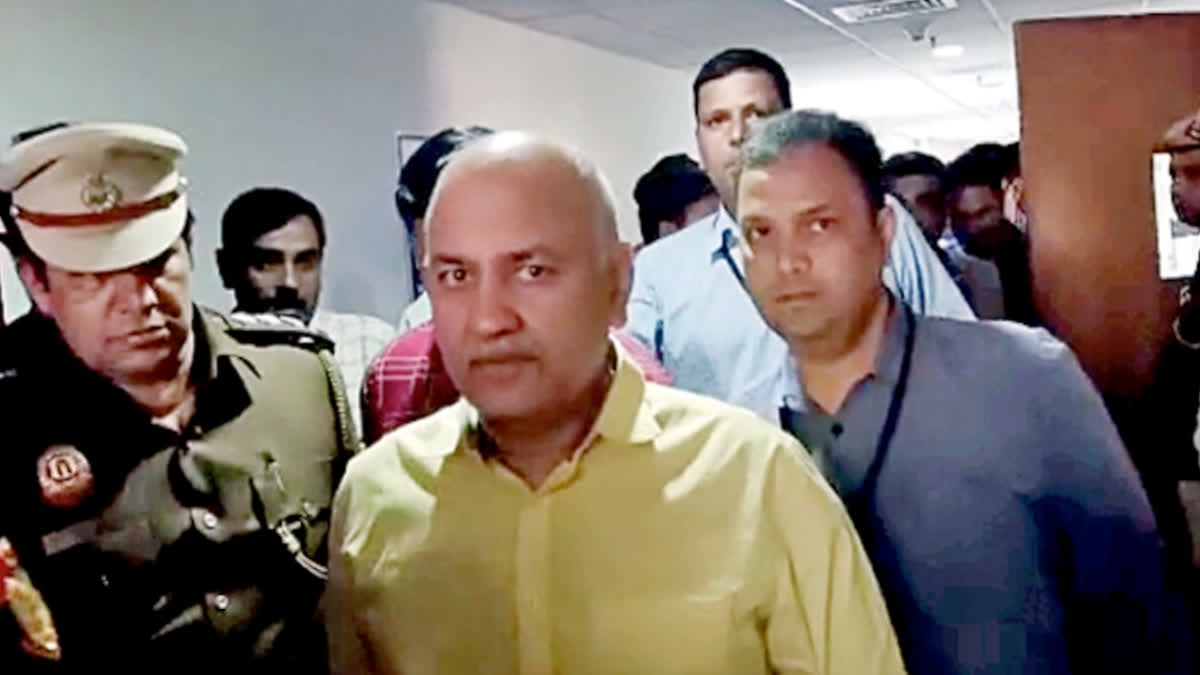New Delhi: The Supreme Court Tuesday reserved the order on bail pleas of former Delhi deputy chief minister Manish Sisodia, who was arrested in the Delhi liquor policy scam.
Senior advocate Abhishek Manu Singhvi, representing Sisodia, submitted before a bench comprising justices Sanjiv Khanna and S V N Bhatti that there was no allegation of bribery against his client in the CBI predicate offence under the Prevention of Money Laundering Act (PMLA). Singhvi stressed that if there is no predicate offence, ED can't be there and the bribe in connection with the modification of the liquor policy with regard to airport licences, is not part of the predicate offence.
Justice Khanna asked Additional Solicitor General S V Raju, representing the CBI and ED, if it is not part of the predicate offence that this bribe was paid, then “you may be in difficulty in proving PMLA”.
The bench further queried if you had said a bribe of Rs 2.2 crores was paid for tweaking the policy, yes. “But you cannot create a predicate offence in your PMLA case. We cannot go on an assumption. Whatever protection is given in the law will be fully extended”, observed the bench.
Raju argued that as per Section 66 (2) of the PMLA, the ED can intimate the jurisdictional police about any new information. The bench said it has not been done, therefore the court will not go on presumption. Singhvi contended that the generation of proceeds of crime occurs only in the predicate offence as per the Vijay Madanlal Chaudhary judgment. After hearing detailed submissions, the apex court reserved its order.
On Monday, the CBI and ED told the Supreme Court that they are contemplating making the city’s Aam Aadmi Party (AAP) an accused in the Delhi liquor policy cases.
Raju said that he has instructions to state that the agencies are considering making AAP an accused, invoking legal provisions on “vicarious liability” and also section 70 of the Prevention of Money Laundering Act (PMLA).
The bench had asked Raju why the arguments on charge have not yet commenced. "When will they? You cannot keep somebody behind infinitely because you are not confident as to when you can argue." The bench stressed that once the chargesheet is filed arguments must commence.
Raju contended before the bench that a person of the rank of deputy chief minister and holding 18 portfolios, including that of the excise department, accepts bribes then a proper example needs to be set. Raju said there are WhatsApp chats and other communications to show conspiracy of money laundering and also claimed that there was sufficient material to show the offence of money laundering. The agencies have also claimed that Sisodia allegedly tampered with evidence by destroying his mobile phones and referred to the statement of Delhi businessman Dinesh Arora, an accused-turned-approver. Raju said Arora had told the probe agencies about the bribes Sisodia took and he did not mention earlier about Sisodia, as he was afraid that he would be harmed.
The apex court was hearing bail pleas of AAP leader and former Delhi deputy chief minister Manish Sisodia, who was arrested in the excise policy cases being probed by the CBI and ED. The hearing in the matter will continue tomorrow.
The agencies have alleged that AAP used the money for campaigning in the Goa assembly elections. They also claimed that AAP was a beneficiary of the kickbacks received from stakeholders who got liquor licences as part of a quid pro quo.



